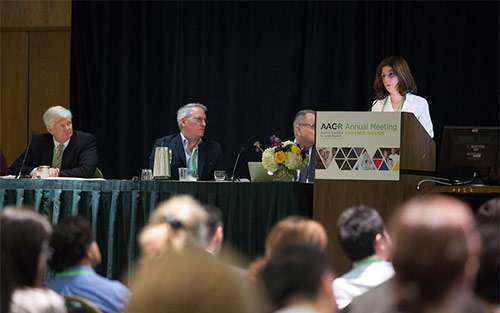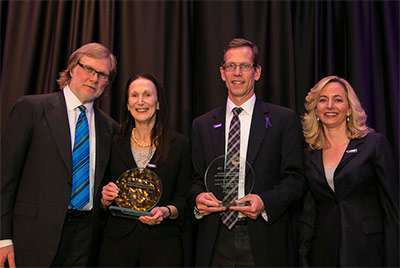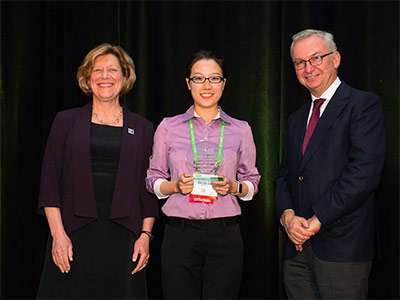
Grantee Nada Kalaany, PhD, spoke at last year’s discussion and poster session at the AACR Annual Meeting. Photo by © AACR/Todd Buchanan 2016
What would you do with $1 million to improve outcomes for pancreatic cancer patients?
A diverse group of seven research teams – MDs and PhDs, representing premier cancer-research institutions like Johns Hopkins, MD Anderson and Sloan Kettering Cancer Center – will get an opportunity to share their strategies and their progress at the American Association for Cancer Research (AACR) Annual Meeting next month.

Bob Vonderheide, MD, DPhil, and his co-principal investigator, Dafna Bar-Sagi, PhD, accepted one of the inaugural Research Acceleration Network Grants alongside former AACR president, Frank McCormick, PhD, FRS, and PanCAN president and CEO, Julie Fleshman, JD, MBA.
Photo by © AACR/Todd Buchanan 2013
Recipients of our prestigious and competitive Research Acceleration Network (RAN) grants, which are administered in partnership with AACR, aim to tackle pancreatic cancer by diagnosing it earlier or via innovative treatment approaches like immunotherapy or precision medicine.
“We established the RAN grant mechanism in 2013,” said Lynn Matrisian, PhD, MBA, our chief science officer. “Even the name – RAN – was meant to convey urgency and speed. The grant was carefully designed with the intent of accelerating progress toward our goal to double pancreatic cancer survival by 2020.”
In order to qualify for a RAN grant, at least two investigators from different institutions, preferably representing multiple disciplines, come together and submit a proposal that undergoes rigorous peer review. Funding decisions are made based on feasibility of the approach, measures of the investigators’ and their institutions’ ability to carry out the necessary experiments and – most importantly – the inclusion of a clinical component that has direct applicability to patients.

Grantee Nada Kalaany, PhD, spoke at last year’s discussion and poster session at the AACR Annual Meeting.
Photo by © AACR/Todd Buchanan 2016
“Also, a unique feature of the RAN grants is project management provided by us,” commented Matrisian. “We have expert staff members who ensure that the research teams are meeting their milestones, overcoming experimental hurdles and communicating regularly on their projects’ progress.”
On Monday, April 3, principal investigators of our seven RAN grants awarded from 2013 to 2015 will speak at the Discussion and Poster Session that we’re hosting at the AACR Annual Meeting.
In addition, we’ll hear from the three scientists who received Pathway to Leadership research grants in 2016. These grants provide $600,000 over five years at a critical moment in a young researcher’s career – as they’re finishing up their postdoctoral training and preparing to transition to an independent assistant professor position.
The Pathway to Leadership grantees’ projects focus on some of the earliest events that make normal cells of the pancreas become cancerous and ways that pancreatic cancer cells break down nutrients differently than healthy cells.

Pathway to Leadership grantee, Wantong Yao, MD, PhD, received her plaque at last year’s conference from Lynn Matrisian and former AACR president, José Baselga, MD, PhD.
Photo by © AACR/Todd Buchanan 2016
“We are very proud to showcase the incredible research being funded by the Pancreatic Cancer Action Network,” added Matrisian. “And for these earlier-career grantees, it’s a wonderful experience for them to get the opportunity to speak at a major conference like the AACR Annual Meeting.
“The grantee presenters will represent the full spectrum of our comprehensive research funding strategy – accelerating progress toward improved patient outcomes and building and strengthening a Community for Progress of bright and motivated scientists focused on this disease.”
Follow the hashtag #AACR17 on twitter and follow @PanCAN, @JulieFleshman, @LynnMatrisian, @victoriamanax and @LolaRahib for real-time updates from the AACR Annual Meeting, April 1 – 5.





